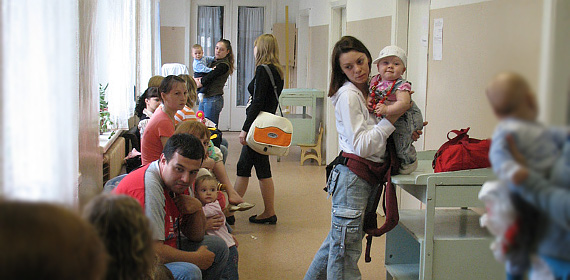Electronic medical records: look into the future or fantasize a little
I hope I guessed with the blog. In any case, I have already seen a post about e-health , but there are no concrete examples, but I wanted to fantasize a little on this topic.
When I go to polyclinics, even private ones, my heart bleeds when I see that they work with paper medical records. They have registries where there are entire staffs of workers who issue and organize cards. People stand in line, waiting.

At the doctor’s appointment, 3/4 of the time is spent on the doctor writing with a pen in his card about the appointment. This record is often impossible to read anyway. And he could just dictate to a nurse who, as an experienced typist, would smartly type on the keyboard at a speed of 260 characters per minute. Here you could also attach photos of symptoms, for example, which this typist-nurse would do right away. I am sure that the time of admission would be reduced by at least 2 times, which means that the doctor could receive 2 times more patients. For private clinics, this is an increase in the effectiveness of investments in a doctor. For government, there are simply 2 times less discontent and an improvement in social indicators.
After 3 years, no one should type anything on the keyboard at all. The doctor should simply speak with his voice, his speech should be recognized and transformed into text. Speech recognition is no secret to anyone, everyone already knows about Google voice search, the process has long been running.
Moreover, diseases and symptoms can be described and standardized, and symptoms will be marked on the patient’s map with icons, not text, to improve perception. Also: just by dictating the list of symptoms, the computer will offer the doctor possible options for the disease (the computer simply calculates them based on the signs and connections, which symptoms correspond to which diseases. Dr. House, thank you) and tells you what other symptoms you need to check for. The likelihood of a medical error will decrease significantly.

All incomprehensible cases (not suitable for anything known) will be stored on a specific server, where they will be systematized under the necessary tags, and special diagnosticians will be notified about this and they will be able to give tips and analyze online. Medicine will turn into mathematics :)
But I ran a little ahead, let's get back to what can be done right now. Right now, the user will be able to watch his card online and the results of the analyzes that he passed yesterday, too. You can store this card on your disk or in any online storage. Official honey cards can only be stored on state. servers or clinic servers that have a license for this.
Personal honey. the card, which is online, itself prompts the user in the form of letters or SMS, when again it is time to visit the dentist. If a diagnosis is not made or treatment is not completed, it reminds of this. The online map analyzes your diseases according to the given algorithms, compares the period and type of the disease, makes up one chain of these links and gives recommendations on which doctor and for what reason should be visited and how critical this may turn out to be. Before going to the doctor on her recommendation, she outlines the reasons for which the recommendation was made, all this can be sent to print for one file.
Doctors in their offices have computers connected to the same network, they just ask the patient for their ID in the system, after which he enters the password on the spot or dictates it from the incoming SMS, and the doctor gets full access to his card right on the spot, no one such as paper cards with a bunch of taped leaves.
I was in GKB 24 in Moscow, where all the doctors had a Mac mini, and there seemed to be no paper cards, although I looked a bit with leaflets there. I asked them locally or is it some kind of global system. They said that local. I did not go into details then, but now, probably, it would be interesting how and what.
The fantasy ended at this place :) I can say to myself that I will now help one of my clients, a private clinic, to introduce an electronic patient database and screw electronic cards to it. But everything is moving much slower than we would like.
Also, I’m going to do it for a long time: get to my honey. cards, scan and retype everything, then arrange by numbers and tags. I wanted to see something like the last time I had an ENT, you type in an ENT search, you get all the records about ENT.
If you have ideas and thoughts on this subject - share it. If you are already familiar with ready-made solutions on this topic, implemented or only those that are being prepared for implementation - also share, tell or give a link.
When I go to polyclinics, even private ones, my heart bleeds when I see that they work with paper medical records. They have registries where there are entire staffs of workers who issue and organize cards. People stand in line, waiting.

At the doctor’s appointment, 3/4 of the time is spent on the doctor writing with a pen in his card about the appointment. This record is often impossible to read anyway. And he could just dictate to a nurse who, as an experienced typist, would smartly type on the keyboard at a speed of 260 characters per minute. Here you could also attach photos of symptoms, for example, which this typist-nurse would do right away. I am sure that the time of admission would be reduced by at least 2 times, which means that the doctor could receive 2 times more patients. For private clinics, this is an increase in the effectiveness of investments in a doctor. For government, there are simply 2 times less discontent and an improvement in social indicators.
After 3 years, no one should type anything on the keyboard at all. The doctor should simply speak with his voice, his speech should be recognized and transformed into text. Speech recognition is no secret to anyone, everyone already knows about Google voice search, the process has long been running.
Moreover, diseases and symptoms can be described and standardized, and symptoms will be marked on the patient’s map with icons, not text, to improve perception. Also: just by dictating the list of symptoms, the computer will offer the doctor possible options for the disease (the computer simply calculates them based on the signs and connections, which symptoms correspond to which diseases. Dr. House, thank you) and tells you what other symptoms you need to check for. The likelihood of a medical error will decrease significantly.

All incomprehensible cases (not suitable for anything known) will be stored on a specific server, where they will be systematized under the necessary tags, and special diagnosticians will be notified about this and they will be able to give tips and analyze online. Medicine will turn into mathematics :)
But I ran a little ahead, let's get back to what can be done right now. Right now, the user will be able to watch his card online and the results of the analyzes that he passed yesterday, too. You can store this card on your disk or in any online storage. Official honey cards can only be stored on state. servers or clinic servers that have a license for this.
Personal honey. the card, which is online, itself prompts the user in the form of letters or SMS, when again it is time to visit the dentist. If a diagnosis is not made or treatment is not completed, it reminds of this. The online map analyzes your diseases according to the given algorithms, compares the period and type of the disease, makes up one chain of these links and gives recommendations on which doctor and for what reason should be visited and how critical this may turn out to be. Before going to the doctor on her recommendation, she outlines the reasons for which the recommendation was made, all this can be sent to print for one file.
Doctors in their offices have computers connected to the same network, they just ask the patient for their ID in the system, after which he enters the password on the spot or dictates it from the incoming SMS, and the doctor gets full access to his card right on the spot, no one such as paper cards with a bunch of taped leaves.
I was in GKB 24 in Moscow, where all the doctors had a Mac mini, and there seemed to be no paper cards, although I looked a bit with leaflets there. I asked them locally or is it some kind of global system. They said that local. I did not go into details then, but now, probably, it would be interesting how and what.
The fantasy ended at this place :) I can say to myself that I will now help one of my clients, a private clinic, to introduce an electronic patient database and screw electronic cards to it. But everything is moving much slower than we would like.
Also, I’m going to do it for a long time: get to my honey. cards, scan and retype everything, then arrange by numbers and tags. I wanted to see something like the last time I had an ENT, you type in an ENT search, you get all the records about ENT.
If you have ideas and thoughts on this subject - share it. If you are already familiar with ready-made solutions on this topic, implemented or only those that are being prepared for implementation - also share, tell or give a link.
